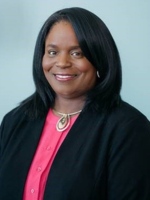
“There’s trauma everywhere,” remarked Angela Tunno, PhD, an assistant professor in psychiatry and behavioral sciences. That’s why the work she and her colleagues are doing to support clinicians across Duke Health and each other in providing trauma-informed, culturally responsive, and equity-focused patient care is so critical.
For decades, Duke’s Department of Psychiatry & Behavioral Sciences has taken a multi-pronged approach to addressing trauma in the local and national community. This work has included conducting extensive research on trauma-related topics; providing patient care, training, and consultation in collaboration with the Center for Child and Family Health; and co-leading the National Center for Child Traumatic Stress with faculty at University of California-Los Angeles. The North Carolina Psychiatry Access Line (NC-PAL) has also helped support efforts to address trauma across the state.
More recently, the department has expanded its cadre of clinicians trained in providing trauma-informed care across the lifespan. This growth has led to better access to care for patients who have experienced trauma. It has also opened up opportunities to educate and support Duke clinicians in caring for these patients. And it’s created a tight-knit community of trauma experts who rely on each other for support, validation, and ongoing personal and professional development. The team’s efforts also extend beyond campus through engagement in local, national, and international community-led partnerships and initiatives.
A Primer on Trauma-Informed Care

“I think of trauma-informed care as being safe, transparent, and patient-centered,” said assistant professor Courtney McMickens, MD, MPH, MHS, a child and adolescent psychiatrist and member of Duke Psychiatry’s trauma team.
Trauma-informed care, she noted, includes ensuring a patient’s physical and emotional safety, clearly explaining the steps of a clinic visit and the rationale behind a recommended treatment, partnering with the patient throughout the care process, and demonstrating cultural humility, to name just a few components of the approach.
Tunno emphasizes the notion of working in partnership alongside youth, adults, and families. She conceptualizes the provider-patient relationship not in the stereotypical hierarchy, but rather as humans working together on a healing journey.
“Trauma-informed care is really about creating a space where every person, including people who have experienced trauma, feels safe, feels included, and feels understood as a whole person,” said assistant professor Stephanie Hargrove, PhD, another member of the team. In a recent Duke Health article, Hargrove discussed several principles of trauma-informed care: safety, trustworthiness and transparency, collaboration and mutuality, empowerment and choice, and understanding of cultural, historical, and gender issues.
“Trauma-informed care is really about creating a space where every person, including people who have experienced trauma, feels safe, feels included, and feels understood as a whole person.”
— Stephanie Hargrove, PhD
Trauma experiences can include—but are not limited to—neglect, acute trauma (from a single event with a potential lasting impact, such as a car accident), chronic trauma (from ongoing events, such as domestic violence), complex trauma (from multiple events of an invasive, interpersonal nature), or collective trauma (from an event experienced by a large number of people, such as a hurricane). Patients may also present with historical and/or intergenerational trauma, racial trauma, and other types of systemic trauma.
Great and Growing Need for Care
“The treatment needs have really boomed. We’re seeing that in the number of referrals,” noted Ernestine Briggs-King, PhD, a recently-retired associate professor and seasoned childhood trauma expert who provided leadership in developing the trauma team. The department receives many referrals each week for outpatient trauma-informed behavioral health care and works closely with colleagues in the community, including the Center for Child and Family Health, to meet the needs.

Another member of the team, assistant professor Briana Brownlow, PhD, sees patients on Duke University Hospital’s psychology consult-liaison service, a program she established in 2022. Many of her patients have been hospitalized due to injuries from traumatic experiences such as gunshot wounds, accidents, assaults, burns, amputations, life-threatening illnesses, and suicide attempts. She works with some patients for a short stint and others throughout their entire hospital stay.
One of Brownlow’s standard treatment goals for her patients who have experienced trauma is to reduce their risk of developing posttraumatic stress disorder. “The analogy I use with my patients is thinking about trauma as a tangled ball of spaghetti, and my goal is to straighten out the noodles so the person can digest it across time,” she explained. “That way, it doesn’t get ‘stuck in their throat,’ and as they continue to process [the trauma], it goes down well.”
Holding Space for Consultation and Validation
Members of the trauma team convene weekly to discuss referrals, consult with each other about ongoing cases, and provide validation and emotional support for one another.

“We bring a case conceptualization in, or we’ll talk about a dilemma we have, or an ethical question, or anything in between, and we’re bringing our trauma-focused care perspectives and expertise into the space,” said Hargrove. “We’re putting together our brains to help us ensure that everyone is getting the best care possible.”
Hargrove adds that the team intentionally carves out time for community building into the weekly meetings, noting that clinical providers often don’t allow themselves the time and space to connect with colleagues on a human level.
“Mutual trust amongst providers has to be built to be able to talk about the impact of trauma on the ones we work alongside, but also the impact of trauma to us, because we’re holding these spaces that are tough,” added Tunno. “And if we don’t lean into that and support each other, that’s where burnout, secondary traumatic stress, and compassion fatigue live. All the stuff that people carry internally, we want to name it. We’re trauma providers—we name the hard stuff.”
“If we don’t ... support each other, that’s where burnout, secondary traumatic stress, and compassion fatigue live. All the stuff that people carry internally, we want to name it. We’re trauma providers—we name the hard stuff.”
— Angela Tunno, PhD

McMickens appreciates working with a team with so much collective knowledge—especially when she’s working on a case with aspects she’s never encountered before—and the opportunities the team meetings afford to consider systemic needs and how to meet them.
These weekly gatherings don’t just uplift the team members; they’re a vital part of the team’s work, which can be rewarding yet emotionally draining. That sense of connection and addressing challenges together is “really, really important to sustaining this work long-term,” notes Briggs-King, who recently transitioned to a leadership role at the Kennedy Krieger Institute and faculty position at Johns Hopkins University after nearly 25 years at Duke.
Sharing their Expertise across Duke Health
The team has also been called upon increasingly to support other Duke Health clinicians—both within and beyond Psychiatry & Behavioral Sciences—in caring for patients who have experienced trauma.
“Providers throughout Duke are seeing trauma-focused cases or seeing patients with a trauma history, and they’re trying to get support,” Hargrove explained. “And they're either acute cases where they’ve needed ongoing support, or they’ve had one-off consultation questions. And we’ve met both of those needs.”
Catherine Cheely, DNP, a pediatric nurse practitioner and pediatric mental health specialist, is among the clinicians who sought the team’s help. Cheely arrived at Duke in the height of the Covid-19 pandemic, expecting to focus on managing psychiatric medication for children and adolescents.
She soon realized, though, that her patients needed much more than medication check-ins; many of them were experiencing suicidal thoughts and engaging in self-harming behaviors, and in part due to the pandemic, connecting them with a therapist often proved challenging.

She received training in a safety protocol for children struggling with suicidal thoughts and began delivering the intervention to patients in her outpatient clinic. “And prior to their suicide attempt or the reason that brought them to the emergency department, many of those children had experienced a lot of trauma in their life,” she recalled. “So I reached out to Angela [Tunno], desperately wanting to figure out how to better support these kids and their families.”
Initially the two met virtually every two weeks to discuss individual cases. Cheely found Tunno’s partnership and guidance so helpful, she asked if they could open up the meetings to some of her colleagues. In response, Tunno—later joined by Hargrove—led a virtual skills and support group for more than a dozen behavioral health clinicians for about a year.
“It was extremely helpful for me, and I can honestly say it contributed to preventing my burnout. I think if I had not received support from Angela, I would have been in a very different place than I am now,” Cheely reflected.
“I’ve worked with a lot of patients who have felt safe and comfortable enough with me that they’ve chosen to disclose things they haven’t shared with anyone else before ... I think that’s because of skills I’ve learned from Angela and Stephanie and the team.”
— Catherine Cheely, DNP
She also recognizes the ways the support has enhanced her clinical practice: “I’ve worked with a lot of patients who have felt safe and comfortable enough with me that they’ve chosen to disclose things they haven’t shared with anyone else before,” she noted. “I’m very honored by that, and I think that’s because of skills I’ve learned from Angela and Stephanie and the team.”
Sarah Pope, BSN, RN, a nurse manager on an inpatient medical oncology unit at Duke University Hospital, recalls a similarly helpful experience working with Brownlow, who not only provided crucial behavioral health support to one of Pope’s complex, long-term patients, but also advised and supported the nursing staff caring for the patient.
“After Dr. Brownlow started working with the patient, we saw countless examples of positive changes in their behavior,” Pope noted. “The patient made intentional efforts to control their response to frustrations.”
Brownlow also came to a nurses’ staff meeting to share helpful strategies and provided a tip sheet for productive, therapeutic communication. Further, she made herself available to staff for questions and checked in with them often. In addition, Brownlow participated in multidisciplinary rounds for the patient, providing insight on the patient’s limitations and capabilities from a mental health standpoint and helping the team clarify discharge goals.
“Overall, Dr. Brownlow’s involvement with this patient was incredibly helpful to our team. This patient had a unique situation and Dr. Brownlow was able to provide a much-needed service,” Pope said. “This helped our nursing team minimize burnout associated with their care. In addition, the communication techniques that Dr. Brownlow suggested helped provide a framework for future patients with these types of behavioral challenges.”
Members of the trauma team have also given Grand Rounds lectures and facilitated training sessions on topics such as trauma-informed care and secondary traumatic stress at Duke and in the local community, as well as nationally and internationally.
What’s Next for the Trauma Team
In addition to educating their colleagues across Duke Health on providing trauma-informed, culturally responsive, and equity-focused patient care, the team is excited about ongoing and new opportunities to train the department’s learners—residents, fellows, clinical psychology interns, and others—in this approach.
This year, the child and adolescent psychiatry fellowship is launching a new child trauma track. The new program builds on a trauma-informed cognitive behavioral therapy training offered to fellows for the past seven years through a partnership between the department, the National Child Traumatic Stress Network, and the North Carolina Child Treatment Program.
The team also continues to engage in community-focused initiatives such as the Trauma-Informed Communities Project. Tunno, Hargrove, and Brownlow co-lead the project with Danielle Mearis-Harrell, MPA, at the Center for Child and Family Health and staff at Community Organizing for Racial Equity (CORE).
“We’re working with providers from different service systems and community members to talk about trauma and its impact: What is it, how do we talk to our families about it, how do we work within systems that are supposed to help that sometimes harm, and how can we do better systemically in being more trauma-informed and inclusive?,” Tunno shared.
Given that the community’s needs for trauma-informed care extend well beyond their current capacity, the team is eager to expand their reach. “It’s been steadily growing, both the number of providers involved with our team and also the interest in consultation and collaboration across Duke,” said Hargrove. “So, I believe our efforts will be sustained, and the trajectory is toward growth.”
The department’s trauma-informed care team also includes clinical associates Jenika Hardeman, PhD, and Tiffany Rowell, PhD, and assistant professor Amelia “Mia” Tankersley, PhD.
Other key leaders in the department’s efforts to address trauma include, among others, Lisa Amaya-Jackson, MD, MPH, Michelle Winn, MD Distinguished Professor and co-director of the National Center for Child Traumatic Stress (NCCTS); Karen Carmody, PhD, associate professor and NCCTS deputy director; and Robert Murphy, PhD, associate professor and executive director of the Center for Child and Family Health.